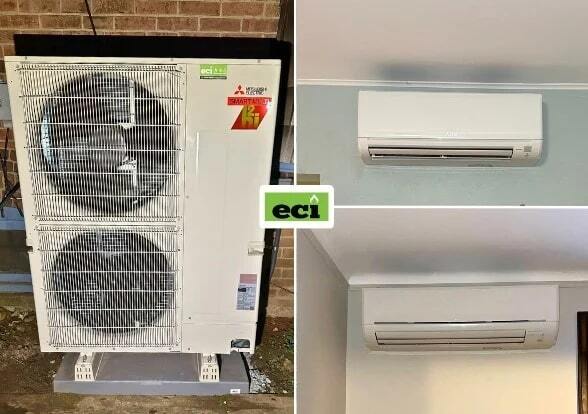As the temperature drops in the Philadelphia area, regular heat pumps may experience reduced efficiency and heating capacity issues. However, cold-climate heat pumps are specifically engineered to operate efficiently in colder climates, with advanced features. These innovative technologies allow cold-climate heat pumps to maintain high efficiency even in sub-zero temperatures, making them an ideal choice for Philadelphia homeowners facing chilly winters.
7 Differences Between Cold-Climate Heat Pumps and Standard Heat Pumps
1. Efficiency in cold weather
- Regular Heat Pumps: May experience a decline in efficiency as temperatures drop, potentially leading to heating capacity issues in extreme cold.
- Cold-Climate Heat Pumps: Engineered to maintain high efficiency even in sub-zero temperatures, often utilizing advanced technologies to address the challenges posed by cold weather.
2. Variable-speed compressor
- Regular Heat Pumps: Typically equipped with single-speed compressors, which can result in on/off cycling and less consistent temperature control.
- Cold-Climate Heat Pumps: Feature variable-speed compressors powered by inverters, allowing for a range of speeds. This enables more precise temperature and humidity control, maintaining consistency even in fluctuating weather conditions.
3. Flash or vapor injection technology
- Regular Heat Pumps: Lack specific technologies to address the potential loss of heating capacity in extremely cold weather.
- Cold-Climate Heat Pumps: Employ flash or vapor injection technology, a mechanism that enhances performance in cold conditions. This technology helps maintain heating capacity and overall efficiency, particularly during severe cold spells.
4. Sensors and controls
- Regular Heat Pumps: Have basic controls and sensors that may not be optimized for efficient operation in very low temperatures.
- Cold-Climate Heat Pumps: Boast advanced sensors and controls designed to regulate refrigerant flow and volume, preventing damage to the unit while ensuring effective operation in cold weather.
5. High-efficiency ratings
- Regular Heat Pumps: Offer standard efficiency but may not have the high Heating Seasonal Performance Factor (HSPF) values seen in cold-climate heat pumps.
- Cold-Climate Heat Pumps: Boast impressive HSPF values, indicating their ability to provide efficient heating throughout the heating season, even in harsh winter conditions. With higher HSPF ratings, these systems qualify for more tax credits and rebates than regular heat pumps.
6. Suitable climate
- Regular Heat Pumps: Ideal for regions with milder climates and less severe winter conditions.
- Cold-Climate Heat Pumps: Tailored for use in states or areas experiencing harsh winters, ensuring reliable heating performance in extreme cold.
7. Geofencing and smart technologies
- Regular Heat Pumps: Can be paired with smart technologies but may not be optimized for extreme weather conditions.
- Cold-Climate Heat Pumps: Often designed to integrate seamlessly with smart thermostats and controllers, offering features like geofencing for enhanced energy efficiency and personalized comfort.
Two Types of Cold-Climate Heat Pumps: Geothermal and Air-Source
Geothermal heat pumps
Geothermal heat pumps harness the Earth's stable temperature to provide an efficient and eco-friendly heating solution, making them a standout choice in cold climates. These systems utilize loops buried underground or submerged in water to exchange heat effectively. While the installation of geothermal systems may be space-intensive and involve excavation, their long-term energy savings and high efficiency make them an attractive option for environmentally conscious homeowners.
By leveraging the constant temperature found below the Earth's surface, geothermal heat pumps excel in maintaining consistent heating performance, even in the coldest of winters. Despite the initial investment, many homeowners find the sustainability and efficiency of geothermal heat pumps to be a compelling choice for their residential heating needs. They qualify for a tax credit of up to 30% of the total installation price which can include well drilling. For example, if the total cost of a geothermal heat pump install is $100,000, the homeowners would qualify for a $30,000 credit.
Air-source heat pumps
 A Cold-Climate Heat Pump Installation in Philadelphia
A Cold-Climate Heat Pump Installation in Philadelphia Hyper-Heat Heat Pump and Mini-Splits
Recent advancements in technology have propelled cold-climate air-source heat pumps to the forefront of efficient heating solutions, even in extremely cold temperatures. These systems, designed with features like variable-speed compressors and improved defrost-cycle controls, offer flexibility for both ducted and ductless applications. Cold-climate air-source heat pumps excel in extracting heat from the outdoor air, even in freezing conditions, providing reliable warmth to homes.
Whether you have existing ductwork or prefer a ductless setup, these heat pumps adapt to various home infrastructures. With ratings up to 15.2 SEER and 8.2 HSPF, they ensure cost-effective heating while minimizing energy consumption. The environmentally conscious homeowner can benefit from the alignment of these heat pumps with electrification initiatives and the increasing incentives for transitioning away from traditional heating methods. Heat pumps qualify for a tax credit of 30% up to $2,000.
Conclusion
Unlike regular heat pumps that may experience reduced efficiency in extremely cold conditions, cold-climate heat pumps are designed to maintain high efficiency even in sub-zero temperatures. This means homeowners can rely on these heat pumps to provide reliable and cost-effective heating throughout the winter season in and around Philadelphia.
If you live in the Delaware Valley/Greater Philadelphia area and would like to find comfort within your home, visit our website or give us a call at 215 - 245 - 3200 to learn more.







